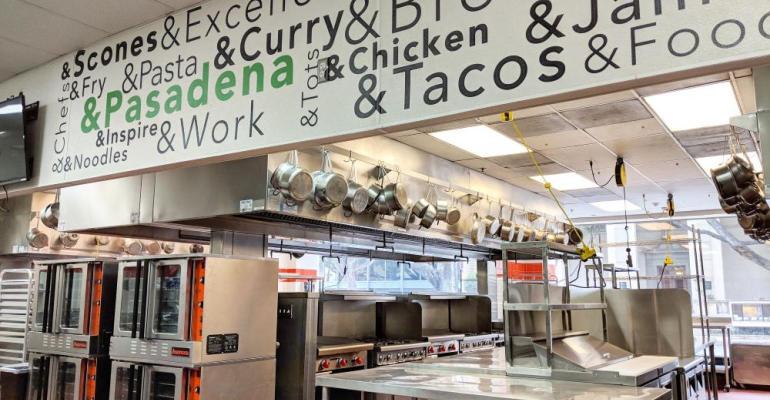Tech Tracker rounds up what’s happening in the technology sector of the restaurant industry, including news from restaurants, vendors, digital platforms, and third-party delivery companies.
This month, our main story comes from an interview with Kitchen United CEO Michael Montagano, who gave some insight into the ghost kitchen company’s recent $100 million fundraising round, with investments from a wide range of industries, including Burger King parent Restaurant Brands International; supermarket company, the Kroger Co.; the Simon shopping malls company; and convenience store chain, Couche-Tard / Circle K.
We also have insights from the quarterly earnings of the major restaurant technology players, including Olo, Toast and the third-party delivery platforms, and some more M&A, and acquisition news in the tech sector.
Here’s a breakdown of what you need to know and why:
Kitchen United CEO Michael Montagano breaks down the $100 million fundraising round
Ghost kitchen technology company Kitchen United announced last month a massive $100 million fundraising round led by investors across various industries, including restaurants, groceries, convenience stores and malls. For CEO Michael Montagano, this new partnership with Restaurant Brands International, Kroger, Simon, and Circle-K represents an opportunity to invest in the company’s technology stack, open locations in new markets and expand the influence of ghost kitchens in the growing on-demand sector.
“We’re looking at areas not only adjacent to our industry and while some people might say they would want to disrupt these industries, our vision has always been to enable these partners to adapt to changing consumer preferences,” Montagano said in an interview with Nation’s Restaurant News.
So in the coming months and years, consumers will soon be able to order pickup from a ghost kitchen at the mall while they’re shopping, or get toiletries, snacks and other convenience store goods delivered to their home, all under the Kitchen United platform. The company’s goal, Montagano said, is to release some of the pressures of on-demand delivery through centralization.
“Our vision is that in order to solve these challenges, there needs to be externalized distribution points that maximize the throughput volume, and enable for pickup and delivery as well as walk-up orders,” he said. “That will allow us to release the pressure on the take rates, bring the customer transaction fees down, and make each delivery actually profitable. We believe that happens by having distribution, technological and physical infrastructure that’s powering delivery all under one hub, and by giving customers more choice.”
In the future, Montagano said, he hopes that this could make transaction fees negligible for operators and increase driver productivity. Moving forward, his team wants to bring more Kitchen United hubs to major markets including a recent expansion into Miami, and soon-to-be new markets, Columbus and Indianapolis, which they will be entering with Kroger. The biggest focus, however, will be to build out spokes around existing hubs in markets where Kitchen United already has a presence to push delivery efficiency to the maximum.
Tech sector quarterly earnings: Toast, Olo, DoorDash and Uber
- Toast’s second quarter showed massive growth for the technology platform, which reported revenue growth of 58% last quarter largely attributable to development acceleration (the company added 68k restaurant locations that use the platform). Labor and food costs — like so many in this operating environment — are the only factors that held Toast’s performance back this quarter.
- Olo, meanwhile, shared an earnings miss for its second quarter ended June 30, and the technology company operated at a loss of $11.9 million, mainly due to macroeconomic challenges. With that trickledown effect, Olo experienced a slowdown in companies signing up for external software as they struggle to keep up with rising inflationary costs.
- DoorDash’s second quarter was defined by growth, as the company’s total number of orders placed last quarter grew 23% year-over-year to $426 million, a record achievement for the company. Gross order totals (including fees and app orders) also hit an all-time high, though the third-party delivery service still thinks it has room to grow.
- The biggest news that came out of the Uber 2Q earnings call is that the company is ending Uber Rewards and instead focusing on its membership fee-based, cross-sectional loyalty program, Uber One, which provides benefits across rideshare, restaurant and grocery delivery services. Uber Eats’ business grew 25% in the U.S. business alone last quarter.
In other technology news….
Around the restaurant tech industry horn, restaurant delivery service Waitr has changed its name to ASAP, to “align with a new company strategy” of delivering anything across all verticals, not just the foodservice industry. Restaurant tech company ParTech has acquired Menu Technologies AG, which will add online ordering to ParTech’s suite of digital capabilities for restaurants. In this month’s segment of tech fundraising news, China-based POS software developer, MenuSifu raised $20 million in a series B fundraiser, with plans to expand its presence further in the US. Robot delivery company Ottonomy raised $3.3 million in a seed funding round and will release the latest version of its delivery bot, Ottobot 2.0, which now includes fully customizable cabins and increased mobility capabilities (including a crab walk).
Contact Joanna at [email protected]
Find her on Twitter: @JoannaFantozzi





